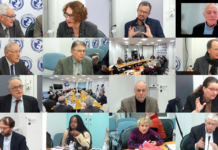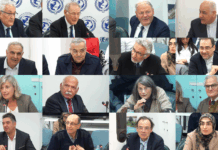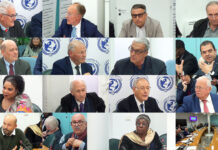Téléchargez l’article au format PDF
David RIGOULET-ROZE
Résumé : Cet article souligne les tensions persistantes liées à la question de la minorité azérie en Iran, la plus importante minorité ethnique du pays. Celle-ci demeure attachée et historiquement intégrée à l’État-nation iranien, ainsi qu’à l’Ommat (« la communauté des musulmans »), bien qu’elle réclame des droits culturels et linguistiques. Des mouvements autonomistes existent, alimentés par une forme de pantouranisme, mais ne sont pas parvenus à mobiliser massivement en vue d’une sécession du Nord-Ouest iranien. Lors des élections présidentielles de 2005 et des manifestations de 2006, les autorités ont réprimé l’agitation. Pour contrer les menaces transnationales, les États-Unis investissent dans la modernisation militaire de l’Azerbaïdjan (modernisation forces et garde-côtière, bases militaires et centres de contrôle) ce qui suscite des tensions avec Téhéran, qui craint un encerclement américain et voit ces actions comme une menace pour sa sécurité nationale. Les relations Iran-Azerbaïdjan se sont aussi tendues en raison d’accusations mutuelles d’ingérence et de manipulations géopolitiques, tensions qui sont exacerbées par les revendications des groupes séparatistes azéris en Iran tels que l’Organisation de la Résistance Nationale d’Azerbaïdjan (ANRO). Ces tensions persistent, malgré la neutralité affichée par Bakou, et sont alimentées par des facteurs historiques, culturels et religieux, mais aussi par des rivalités géopolitiques et des alliances changeantes dans la région. Israël et les États-Unis sont accusés de préparer des frappes contre l’Iran depuis le territoire de l’Azerbaïdjan. Les manœuvres militaires conjointes entre l’Azerbaïdjan, la Turquie et le Pakistan en 2021 ont inquiété Téhéran, mais cette inquiétude réside surtout dans le fait que l’Azerbaïdjan soit en passe de devenir une nouvelle puissance régionale, susceptible de modifier l’équilibre des pouvoirs. Traditionnellement concentrée sur les théâtres d’opérations du Moyen-Orient, Téhéran semble opérer un recentrage sur la Transcaucasie, plus particulièrement le Sud-Caucase, face aux menaces multiformes de déstabilisation de la frontière septentrionale de l’Iran.
Mots-clés : Iran, Azerbaïdjan, Caucase, Minorité ethnique, Minorité Azérie, Grand Azerbaïdjan, Pantouranisme, Géopolitique, Géostratégie, Relations internationales, Autonomisme, Nord-Ouest iranien, Répression, Intégration, États-Unis d’Amérique, Israël, Turquie, Pakistan, Tensions, Bakou, Téhéran, Bases militaires.
THE AZERI MINORITY AND THE IRANIAN SPECTRUM OF A UNIFIED “GREATER AZERBAIJAN”, POTENTIALLY FED BY A FORM OF PANTURANISM
Abstract : This article highlights the persistent tensions related to the issue of Azeri minority in Iran, the country’s largest ethnic minority. This minority remains attached and historically integrated to the Iranian nation-state, and the Ommat (“the community of Muslims”), all though it claims cultural and linguistic rights. Autonomist movements exist, powered by a form of pan-Turanism, but have not succeeded in mobilizing massively for a secession of the Iranian North-West. During the presidential elections of 2005 and the 2006 protest demonstrations, the authorities repressed the agitation. In order to counter transnational threats, the United States are investing in the military modernization of Azerbaijan (modernization of forces and coast guard, military bases and control centers) which creates tensions with Tehran, who fears an American encirclement and sees these actions as a threat to its national security. The Iran-Azerbaijan relations became strained due to mutual accusations of interference and geopolitical manipulation, tensions which are exacerbated by the claims of separatist Azeri groups in Iran such as the Azerbaijan National Resistance Organization (ANRO). These tensions are persistent, despite the neutrality shown by Baku, and are powered by historical, cultural and religious factors, but also by geopolitical rivalries and shifting alliances in the region. Israel and the United States are accused of preparing strikes against Iran from the Azerbaijan territory. The joint military maneuvers between Azerbaijan, Turkey and Pakistan in 2021 have worried Tehran, but this worry resides especially in the fact that Azerbaijan is about to become a new regional power, which could modify the balance of powers. Traditionally focused on the Middle East theatres of operation, Tehran seems to be operating a refocusing on Transcaucasia, more specifically the South Caucasus, facing multiform threats of destabilization on Iran’s Northern border.
Key words : Iran, Azerbaijan, Caucasus, Ethnic minority, Azeri minority, Greater Azerbaijan, Pan Turanism, Geopolitics, Geostrategy, International relations, Autonomism, Iranian North-West, Repression, Integration, United States of America, Israel, Turkey, Pakistan, Tensions, Baku, Tehran, Military bases.








